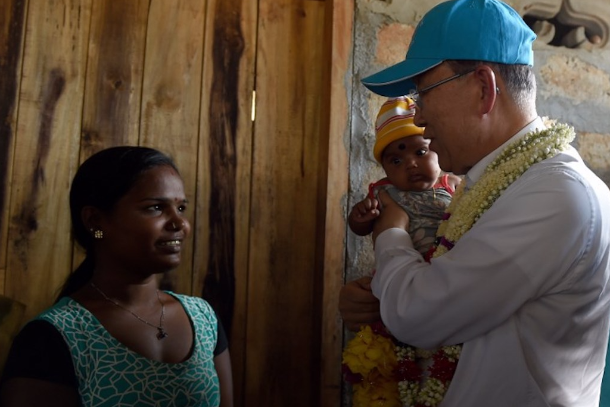
by Quintos Uintus Colombage, Negombo, Sri Lanka 5 April 2019
Then U.N. secretary-general Ban Ki-moon carries a four-month-old baby at the resettlement village of Veeman Kamam on the Jaffna Peninsula on Sept. 2, 2016. He was wrapping up a two-day visit to Sri Lanka seven years after the end of its decades-long Tamil separatist war. He urged authorities to speed up ethnic reconciliation and accountability for war crimes. (Photo by AFP)
Sri Lanka needs to strengthen its national institutions by including more foreign experts like judges, prosecutors and investigators in key decision-making roles to ensure allegations of war crimes and human rights abuses are fairly investigated, according to a prominent rights defender.
Colombo has taken flak for ignoring calls from U.N. bodies to set up hybrid courts featuring international personnel so that past grievances dating back to the nation’s civil war can be resolved, and the goal of national reconciliation achieved.
But such hybrid courts would not be necessary if domestic bodies are reformed, said Dr. Jehan Perera, executive director of the National Peace Council.
“If Sri Lankan institutions act with integrity and do their duty in a sustained manner, there will be no need for either universal jurisdiction or hybrid courts to become operational, or for further international interventions to facilitate national reconciliation,” he said.
“Sri Lankans need to unite to find a mechanism in which those who make the decisions are acknowledged by all parties to be ethnically and politically unbiased.”
Perera specializes in conflict resolution and focuses on identifying the multiple perspectives that coexist in such situations.
His input comes after the U.N adopted a new resolution on March 21 co-sponsored by the Sri Lankan government.
That gave the island country another two years to set up a credible investigation into past claims linked to the three-decade conflict between the government and the Liberation Tigers of Tamil Eelam (LTTE).
The LTTE was an insurgent group that aimed to carve out a separate Tamil homeland in the country’s north and east. It was finally defeated by Sri Lanka’s military in 2009.
Yet some people who disappeared during that heady period have yet to be accounted for, and their families claim it is unrealistic to expect a government-run probe to expose the military’s former misdeeds.
“The next two years give Sri Lanka the opportunity to take charge of its reconciliation process while meeting international standards,” said Perera, who has a law degree from Harvard.
Resolution 30/1 issued by the United Nations Human Rights Council (UNHCR) commits the country to establish a judicial mechanism with a special counsel to investigate alleged violations of international humanitarian law.
The U.N.’s Office of the High Commissioner for Human Rights (OHCHR) has urged Colombo to establish a hybrid court to deal with war crimes and human rights abuses comprising foreign judges and investigators.
Both parties to the conflict have been accused of egregious violations. The U.N. claims that at least 40,000 civilians were killed during the final stages of the civil war alone.
The UNHCR invited Colombo to establish a country office to monitor the human rights situation on the ground, but Foreign Minister Thilak Marapana said that accepting foreign judges would require a charter rewrite and a referendum.
President Maithripala Sirisena said the U.N. resolution was co-sponsored without his knowledge. He described it as a betrayal of the nation’s armed forces. Sirisena has vowed not to implement any measures that would be in breach of the constitution.
Ex-president Mahinda Rajapaksa, now the chief opposition leader, said Sri Lanka should support the U.N. resolution.
Meanwhile, rights watchdogs have called on the government to honor its commitments.
Relatives of Tamils who disappeared during the war say the national plan for reconciliation must be conducted in a timely manner, with victims receiving justice and the guilty being held accountable.
Amnesty International said the families of many victims are becoming disillusioned. “Transitional justice must not become a casualty of Sri Lanka’s political situation. To ensure no further delays take place, the government should work together with the U.N. to develop a time-bound implementation strategy, as recommended by the resolution,” said Biraj Patnaik, Amnesty International’s South Asia director.
Perera said the government has no excuse for dragging its feet. “The slow pace of progress covers nearly all of the areas Sri Lanka committed itself to delivering on, including finding missing persons, returning land, releasing detainees held without trial, replacing the Prevention of Terrorism Act, and bringing those accused of war-related crimes and other serious crimes to justice,” he said.
Tamil activist Nitthila Rajendran said it was time for Colombo to stop prevaricating and respect the public it is supposed to serve. “The government should address the rights of all its people,” he said..
